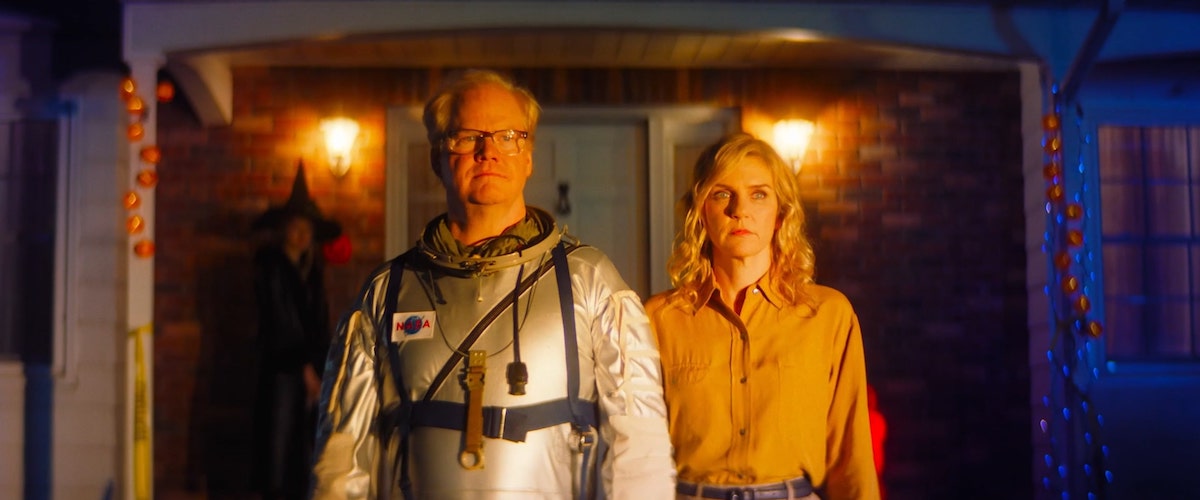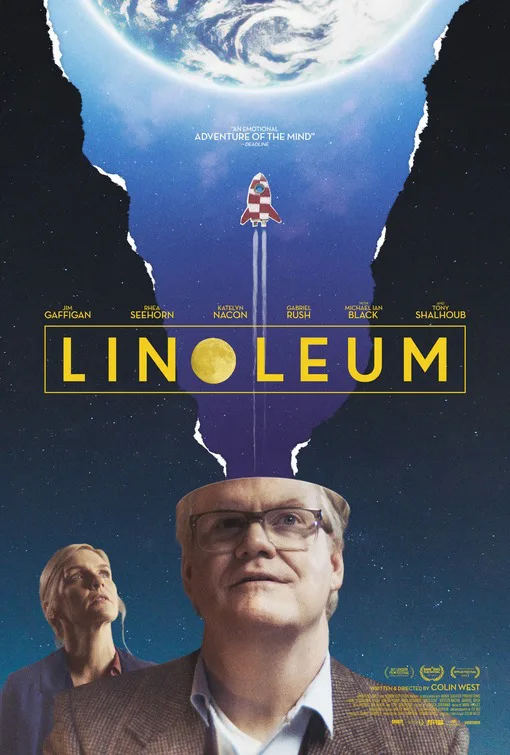Early in “Linoleum,” a 54-year-old sad sack named Cameron (Jim Gaffigan), the host of a local TV science program, watches a red sports car fall from the sky and land on a suburban street. The car contains a person who looks like Cameron (also played by Gaffigan) and who will eventually take Cameron’s job. As the story goes on, the falling car is referred to as an event but not parsed in terms of what “actually” happened. Even at the end of “Linoleum,” when the movie gives you a bit more context for its pervasive off-kilterness, the falling car is not fully explained, because this is the kind of movie where what happens is less important than what it means—not what it means in a YouTube video way (“The Ending of Linoleum Explained!“), but what it means emotionally. Most of the important moments, lines, and images are given this treatment, whether it’s a chunk of a rocket that falls into the same neighborhood, the recurring visits by a grey-haired woman who stares quietly from a distance, or the coincidence of two high school students discovering that they have the same birthday.
“Linoleum” puts critics in a difficult spot (provided that they like it) because the more details of its story you offer, the more it sounds like a shallow “twist” movie—the kind where you get to the end and go, “Aha, now I know what I was looking at! How clever!” and never feel the urge to watch it a second time. I’m sure some will choose to treat “Linoleum” that way: as a puzzle to be solved, perhaps as quickly as possible, like setting a time limit on a crossword. It somehow evokes both “Donnie Darko” and “The World According to Garp” (the film version of which has a biplane hitting the main family’s house, just because that’s the sort of thing that would happen to them). “I’m suspecting that perhaps the universe in our head is more real than reality itself,” a character says.
Personally, I thought the final ten minutes, when the filmmaker at long last gives you something, played like less of a wrap-it-all-up-in-a-pretty-pink-bow explanation than a minimal goodwill gesture aimed at people who want to at least feel as if they know what “really” happened. Rod Serling might have appreciated it because the best episodes of “The Twilight Zone” (“The Eye of the Beholder” is one example) seem to give you an explanation (it’s about relative standards of beauty!) even as a richer layer sits there un-explicated (think about what’s playing on the TV set in the hallway at the very end of that episode).
I digress, but hopefully in the manner of “Linoleum”—i.e., with intent.
Speaking of TV sets: the movie begins and ends with grainy images of a videotape, probably circa 1980s or ’90s, being played on a pre-digital television. It’s Cameron’s local science show. The emotional and narrative seesaw begins. Cameron’s show is on the verge of being picked up by PBS. Wait, never mind; he’s fired. And Kent, the guy driving the car that fell out of the sky, is taking his place. Kent is a charismatic, smug dynamo, with a hard edge. When playing Kent, Gaffigan stiffens his spine, wears a brown wig (Cameron’s hair is wild and ashy blond), and lowers his voice half an octave and adds a bit of gravel to it; the result feels like a Philip Seymour Hoffman performance that never existed. “You look like a younger, handsome version of me,” Cameron tells him.
Cameron becomes obsessed with becoming an astronaut and building his own rocket, using the debris that crashed in his backyard as a starter kit. Cameron’s wife, Erin (Rhea Seehorn), is a conscientious mate and mother, but she’s dissatisfied with suburban life. She and Cameron are about to divorce. They have a daughter named Nora (Katelyn Nacon), who says she’s bisexual, despises the popular cliques at school, and resents everything connected with suburban American life. Nora develops a powerful affinity for the new guy at school, Marc (Gabriel Rush), who just happens to be the only son of Kent, who just bought the house across the street from Nora’s family. Marc appears to see the good in everyone up to a point. He bonds with Cameron immediately, and even says he wishes his own dad was like him.
West introduces a lot of scenarios and moments that feel like indirect mirrors of each other, reflecting characters back at other characters, and (perhaps) refracting bits and pieces of additional characters as well as cultural touchstones that might or might not mean something in “Linoleum.” Cameron and Kent’s houses mirror each other geographically. Kent is the name of a character in King Lear who is banished but disguises himself and sneaks back into Lear’s presence and stays close, hoping to protect the old man from his worst tendencies. Nora is the name of the heroine of Henrik Ibsen’s play A Doll’s House, about a young 19th-century wife and mother who leaves her family to seek happiness. The main family’s last name is Edwin, the title character of Charles Dickens’ unfinished last novel, The Mystery of Edwin Drood. It’s to the filmmaker’s credit that he could say, “None of these connections were intentional,” and have you believe him. Still, for kicks, wait until after you’ve seen “Linoleum” and then look up what Dickens told a friend about his last novel in a letter just before he died.
When Cameron visits his elderly, dementia-suffering father Mac (Roger Hendricks Simon) in a memory care facility, Mac twice explains the concept of a Möbius strip, then the camera moves laterally to show a third repetition happening in a mirror. Cameron’s life is a partial mirror of his father’s; they both were engineers who decided they wanted to go into space long after NASA would have accepted them. The placement of Cameron and Kent’s homes across from each other creates another mirror of sorts.
A lot of mirrors, reflections, and screens are deployed in this movie. But they’re placed by West and cinematographer Ed Wu (channeling past masters like Harris Savides, who once warned, “Don’t make things too beautiful“) in such a way as to make you pay closer attention to what’s happening in the frame at that moment, but without indicating precisely what you’re supposed to think about. West’s writing and direction, Wu’s photography, Marc Hadley’s circa-early-’80s synth score, Keara Burton’s editing, and the rest of the production team’s efforts are in sync. In the more lyrical sections (such as a slow-motion music montage that builds out the main characters’ worlds), the filmmaking itself takes center stage, not in a showy or domineering way, but as if the actors and filmmakers are just having fun, like kids trying to see how long they can bat a balloon around without letting it hit the floor.
Gaffigan, who’s proven himself a Nick Offerman/John Carroll Lynch-level character actor many times already, proves it again here in two roles. He seems to live completely within the sadness/disappointment of one and the control freak edginess of the other. Nacon, best known for “The Walking Dead,” grounds a character whose rebellious tendencies could become cliches if not depicted with care. Rush’s face, haircut, and demeanor are reminiscent of the hero of “Almost Famous,” but there’s something uniquely weighty and rueful about his work here that connects his character to the Edwins, all of whom grapple with melancholy even when they’re having fun.
Seehorn initially seems stuck in a better-written version of a standard indie movie Suffering Wife, but halfway through the story, you start to understand why she wanted to do the role. Her delivery late in the film of a profane two-word phrase that you’ve heard (and perhaps said) reinvigorates it and invests it with layers of insight—and notice how the movie holds on Seehorn for a few seconds afterward, as the character thinks about the meaning and repercussions of the act. “Linoleum” does that with many characters: giving them an extra beat after a big moment, so that they can make you feel two or three things instead of one.
Does everything in the film work? No. If pressed, I’d say that by this point, there have been so many American films about suburban guys in midlife crisis that even when “Linoleum” persuades you that it was never only about that, you might still feel like you’ve seen it before and didn’t need to see it again. I could also say that I would’ve liked the movie even better if it hadn’t even gone through the motions of wrapping things up (the editing at the very end puts a hat on top of a hat, if that makes sense). Nevertheless, I appreciate how, like a good “Twilight Zone,” and like certain Steven Spielberg movies, it seems to be doing a single, obvious thing because that gives it the cover it needs to do multiple, smaller, subtler things at the same time. It’s a small movie that takes big swings.




















